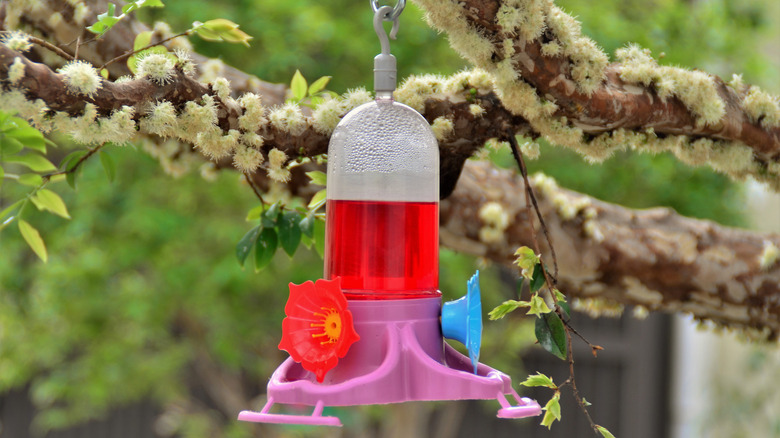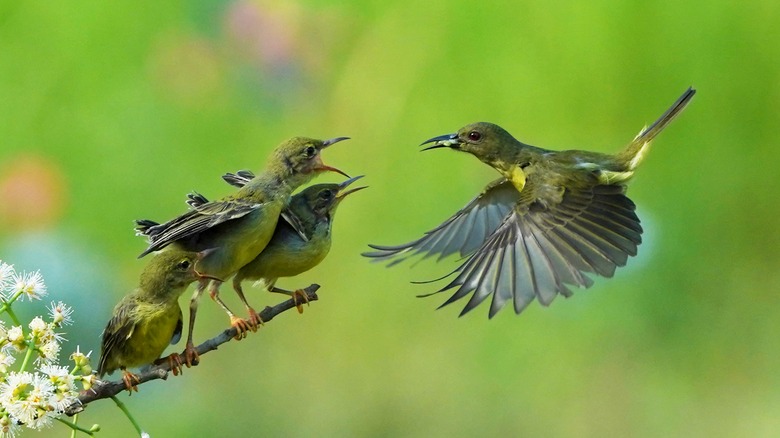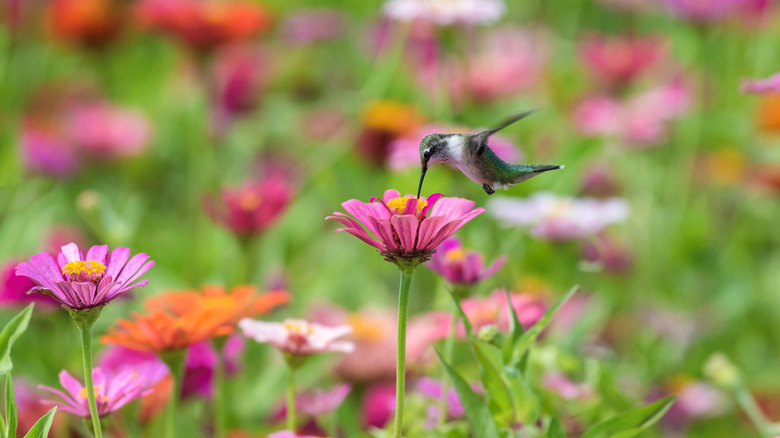Common Reasons Your Busy Hummingbird Feeder Is Suddenly A Ghost Town
It's perfectly normal for hummingbird feeder visitations to vary. So it's quite possible — most likely, even — that nesting, migration, or the annual blooming of nectar-filled flowers nearby is why you might see fewer hummingbirds at your feeders in midsummer. However, there could be other reasons for hummers ghosting a feeder, ranging from simple human error to something slightly nefarious. A predator might be stalking the wee avians as they dine, scaring them away, or other, non-hummer visitors might be drinking all the nectar. Male hummingbirds are territorial; one could be scaring all others away from that week's lunch. It may be that you simply haven't kept on top of essential feeder maintenance.
Migration, beginning in late summer, is one of the biggest reasons for a sudden decline in the hummingbirds visiting your feeder. Typically, the disappearance isn't actually sudden: male birds leave first, then females, then the youngest birds. But unless you're paying very close attention to your feeders, it may appear more like a deluge rather than a trickle. Also note that while your regular visitors may have started their journey south to warmer climes around the same time, there may be some new stragglers coming your way on their flights. So leave that feeder up! Not sure when hummingbirds migrate from your area? Luckily, there are databases available that shares that information for each hummingbird species.
How the birds and the bees affect hummer numbers at feeders
If one day you find your hummingbird feeder dearth of jewel-feathered friends, particularly if it's spring, watch closely to see if a particularly persnickety hummer is hanging around. Male hummingbirds are fierce in their defense of their territory, and are known to drive other hummers, as well as even other birds and insects, away from coveted property like nectar feeders. Another male-related reason you may think hummingbirds are avoiding your feeder is because only males are visiting it. Due to being so territorial, they tend to swoop in, guzzle nectar, and fly away again all at lightning speed. This is opposed to perching, lingering females. In other words, they're there; you simply might not be spotting them. Time to brush up on those backyard bird watching skills!
Speaking of female hummingbirds, it's also very possible you're noticing a decline because they're busy sitting on nests and rearing their young. At this time, they prefer to eat insects over nectar. Plus, they may have left your garden altogether for their preferred nesting sites. If this is the reason for a sudden drop in hummingbirds to your feeders, you'll feel the absence most between mid-May and late July. Want to bring them back? Plant red buckeyeor English hawthorn; hummingbirds will flock to these nest-building plants in your garden, among others.
Are backyard birders responsible for hummingbird disappearances?
If plants are blooming right now, go check them out and see if you can spot your missing flying gems. These wholly natural alternatives are so attractive to hummingbirds that they may be sipping from their nectar-filled cups instead of those attached to your feeder. To put it simply, if there's an abundant source of wild food nearby, hungry hummers often choose that over human-supplied options. Chances are your neighbors hung feeders, and the local hummers are ditching your backyard for theirs. You could also blame adverse weather conditions. If feeders get rained on, it dilutes the nectar to such an extent that hummingbirds avoid it. They might also be temporarily forced from your yard by storms. A lack of insects due to heavy pesticide use might also be to blame for fewer hummer sightings — at feeders and overall. Hummingbirds won't choose nest sites devoid of energy-giving bugs.
Don't make the mistake of putting your hummingbird feeder in the wrong spot, and by this we mean putting it in a location that makes your plumed visitors susceptible to predation. If the feeder's hanging somewhere where, for example, your canine or feline family members can easily pounce on the birds, the scared hummers will stop coming around. Likewise, other critters — think orioles, woodpeckers, insects like bees, butterflies, and wasps, and even racoons — might be visiting your feeders for the nectar and, while not attacking the hummingbirds directly, may intimidate them.


